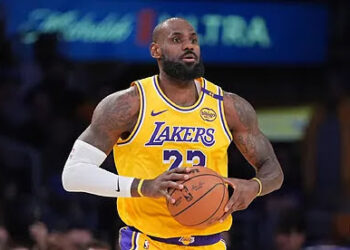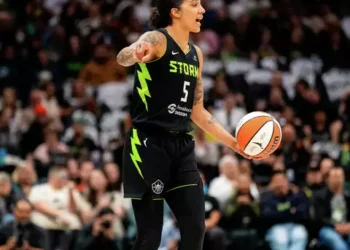In the high-stakes world of professional basketball, where the acquisition of a superstar can shift a franchise’s fortunes overnight, it’s rare—almost unthinkable—for a coach to openly admit relief that an MVP-caliber player didn’t end up on his roster. Yet, behind closed doors, and increasingly in subtle public comments, one NBA coach has hinted that he’s content Joel Embiid, the dominant Philadelphia 76ers center, didn’t choose to wear his team’s colors.
To understand this surprising sentiment, you have to look beyond Embiid’s towering averages—his 30-plus points per game, the defensive presence that clogs the paint, the way he draws double-teams with ease—and instead focus on what his presence demands from a team’s system, culture, and chemistry.
When Embiid was rumored to be exploring his future in Philadelphia amid the 76ers’ playoff frustrations and front-office reshuffles, several teams made quiet overtures. Some insiders say that the Miami Heat, New York Knicks, and even the Boston Celtics explored how they might accommodate the 7-footer. But among those rumored to be interested were the Oklahoma City Thunder—a team whose head coach, Mark Daigneault, has since all but confirmed he’s glad the deal never materialized.
On paper, it sounds absurd. The Thunder are a young, rising team with enviable draft capital, a well-stocked roster of talented wings and guards, and a clear identity built on speed, ball movement, and versatility. Slotting in an MVP like Embiid would, theoretically, push them from a promising playoff team to an immediate title contender.
But Daigneault and the Thunder front office see it differently. This is a team that has meticulously built an ecosystem where no single star’s gravitational pull distorts the collective orbit. Shai Gilgeous-Alexander is blossoming into a superstar, but he does so within the context of a balanced, share-the-ball offense. Josh Giddey, Jalen Williams, and Chet Holmgren are developing alongside him, creating a fluid, positionless style that thrives on constant motion and adaptability.
Adding Embiid—dominant but undeniably ball-dominant—would have required upending that blueprint. Offensively, everything would need to flow through him in the post or high elbow. Double-teams become the norm, spacing needs to be immaculate, and everyone else’s role shrinks. For a team that has prioritized player development and collective buy-in over immediate championship chasing, that’s a dangerous trade-off.
And then there’s the other concern: Embiid’s health. For all his brilliance, Embiid has never shaken the label of being injury-prone. He’s missed significant stretches of nearly every season he’s played since entering the league. For a coach like Daigneault—tasked with building sustainable success—mortgaging young talent and draft picks for a superstar who might be sidelined during a crucial playoff push would be a gamble at odds with the Thunder’s deliberate rebuild.
Speaking to reporters during Summer League, Daigneault didn’t name Embiid outright, but when asked about trade rumors for big-name centers, he was candid: “We love what we’re building here. This team’s identity is clear. Everyone touches the ball, everyone defends. We don’t want to shortcut that. We’re not in a rush to flip the switch at the cost of what makes us who we are.”
It was as much a coded message to his own front office as it was to the fans. Superstars sell tickets, but not every superstar fits every system. And Embiid’s brand of dominance demands a team willing to orbit around him, rather than one in which the whole is greater than the sum of its parts.
For the Thunder—and Daigneault in particular—the commitment to slow-cooked team building remains stronger than ever. Holmgren, though nowhere near Embiid’s level yet, offers a stretch-big skill set more compatible with their free-flowing offense. He can protect the rim while spacing the floor, run in transition, and doesn’t need the ball in the post to impact the game. In short, he’s the type of big who amplifies the Thunder’s strengths instead of redefining them.
Of course, it’s easy to imagine a scenario where a healthy Embiid bulldozes his way to the Finals with a better supporting cast. But in Oklahoma City, the philosophy is different: build sustainably, trust your young core, and resist the temptation of a quick fix.
If Embiid does eventually leave Philadelphia—and rumors will always swirl—there will be no shortage of suitors willing to bet the farm. But Mark Daigneault and the Thunder are quietly thankful they won’t be one of them. Sometimes, the best move is the one you don’t make. And sometimes, the most daring coaching decision is to say no to a superstar when everyone else would say yes.
In a league obsessed with big splashes, the coach who’s happy Joel Embiid didn’t join his team might just prove that patience and fit still matter mo
re than star power alone.











